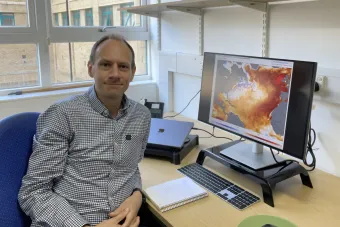
Studying the physical processes within our ocean and their interaction with the atmosphere and coastlines is vital in understanding the impacts of climate change. The National Oceanography Centre’s (NOC) Marine Physics Ocean Climate (MPOC) scientists use a variety of tools including ships, autonomous vehicles, and satellites to monitor our changing seas all over the world.
For this month’s scientist spotlight we spoke to Physical Oceanographer Dr Jules Kajtar about how his fascination with outer space inspired his career in ocean science.
What is your role in research at NOC?
I am a Senior Research Scientist and Physical Oceanographer in the Marine Physics and Ocean Climate (MPOC) group, based in Southampton. My primary role in the Ocean Circulation and Processes (OCP) subgroup is working within the RAPID programme. I work with observational and model data to understand the changes in North Atlantic Ocean circulation, and the potential impacts on our future climate. Another area in which I have worked is on understanding marine heatwaves and their drivers.
What drew you to working in this area?
I was interested in stars and space from an early age, wanting to understand how the universe works. I found it amazing that we know so much about the universe, including how it started with the Big Bang (and how long ago), as well as the ages and distances to stars, galaxies, and other objects. And yet there is still a lot we don’t know. Having studied astrophysics at an undergraduate level, I then undertook a PhD in general relativity – specifically, simulating the massive stars that eventually collapse form black holes. Like space, much of our ocean is also yet to be explored however the issues it is facing are of even more immediate importance. I therefore later decided to shift to working in climate science and oceanography, to help tackle these challenges.
What science are you currently working on?
The RAPID array of moorings across the North Atlantic Ocean at 26°N has been observing the Atlantic Meridional Overturning Circulation (AMOC) since 2004. The AMOC, which is an ocean circulation pattern extending across the South and North Atlantic, is a key component of the Earth’s climate system. It influences temperature and rainfall over Europe, North America, and further afield, and there are concerns that its slowdown or collapse would dramatically alter our climate. I am playing a part in the next phase of the RAPID programme, which aims to explore how the mooring array can continue to deliver high-quality observations of the ocean circulation, but more sustainably and at a reduced cost.
With regards to marine heatwaves, I am part of a team looking to understand the drivers and predictability of marine heatwaves, as well as trying to determine their impacts on the marine ecosystem more carefully.
What is your favourite thing about the work you do?
The people I work with. Being involved with a few different research topics means that I get to interact with a wide range of interesting and diverse people. I work with people all around the world (mostly via videoconferencing and email), but the people at NOC especially make it an exciting and vibrant place to work.
What impact does your science have on society?
By improving our understanding of various aspects of the climate system, such as the North Atlantic overturning, or marine heatwaves, we can increase our confidence in what might occur in future under climate change. We hope that stronger lines of scientific evidence will lead to stronger actions to reduce greenhouse gas emissions.
More from Dr Jules Kajtar
Into the Blue podcast
Jules talks through how marine heatwaves can negatively impact the marine environment on which we depend and what NOC is doing to tackle them.. This video is part of the ‘Into the Blue Podcast’ series.
Go Under the Surface
The ocean supports the livelihood of over three billion people and provides the main protein source for one billion people worldwide. Marine heatwaves negatively impact this complex ecosystem, causing devastating effects to marine life and our society. Due to climate change, marine heatwaves are becoming more frequent, more intense, and longer lasting.
Join the NOC Ocean Alliance
If you or your organisation would like to find out more about supporting our endeavours, contact us at giving@noc.ac.uk. A gift allows you to have a direct impact on world leading ocean research and innovation, and helps ensure NOC continues to make global impact from the coast to the deepest ocean. Whatever your passion – combating climate change, conserving and protecting ocean life, or equipping the next generation of marine scientists, donate today.